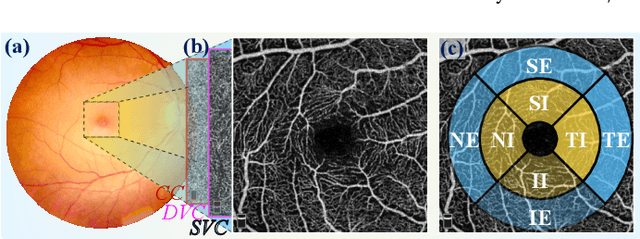Shuting Zhang
Beyond the Eye: A Relational Model for Early Dementia Detection Using Retinal OCTA Images
Aug 09, 2024



Abstract:Early detection of dementia, such as Alzheimer's disease (AD) or mild cognitive impairment (MCI), is essential to enable timely intervention and potential treatment. Accurate detection of AD/MCI is challenging due to the high complexity, cost, and often invasive nature of current diagnostic techniques, which limit their suitability for large-scale population screening. Given the shared embryological origins and physiological characteristics of the retina and brain, retinal imaging is emerging as a potentially rapid and cost-effective alternative for the identification of individuals with or at high risk of AD. In this paper, we present a novel PolarNet+ that uses retinal optical coherence tomography angiography (OCTA) to discriminate early-onset AD (EOAD) and MCI subjects from controls. Our method first maps OCTA images from Cartesian coordinates to polar coordinates, allowing approximate sub-region calculation to implement the clinician-friendly early treatment of diabetic retinopathy study (ETDRS) grid analysis. We then introduce a multi-view module to serialize and analyze the images along three dimensions for comprehensive, clinically useful information extraction. Finally, we abstract the sequence embedding into a graph, transforming the detection task into a general graph classification problem. A regional relationship module is applied after the multi-view module to excavate the relationship between the sub-regions. Such regional relationship analyses validate known eye-brain links and reveal new discriminative patterns.
M3KE: A Massive Multi-Level Multi-Subject Knowledge Evaluation Benchmark for Chinese Large Language Models
May 21, 2023



Abstract:Large language models have recently made tremendous progress in a variety of aspects, e.g., cross-task generalization, instruction following. Comprehensively evaluating the capability of large language models in multiple tasks is of great importance. In this paper, we propose M3KE, a Massive Multi-Level Multi-Subject Knowledge Evaluation benchmark, which is developed to measure knowledge acquired by Chinese large language models by testing their multitask accuracy in zero- and few-shot settings. We have collected 20,477 questions from 71 tasks. Our selection covers all major levels of Chinese education system, ranging from the primary school to college, as well as a wide variety of subjects, including humanities, history, politics, law, education, psychology, science, technology, art and religion. All questions are multiple-choice questions with four options, hence guaranteeing a standardized and unified assessment process. We've assessed a number of state-of-the-art open-source Chinese large language models on the proposed benchmark. The size of these models varies from 335M to 130B parameters. Experiment results demonstrate that they perform significantly worse than GPT-3.5 that reaches an accuracy of ~ 48% on M3KE. The dataset is available at https://github.com/tjunlp-lab/M3KE.
 Add to Chrome
Add to Chrome Add to Firefox
Add to Firefox Add to Edge
Add to Edge